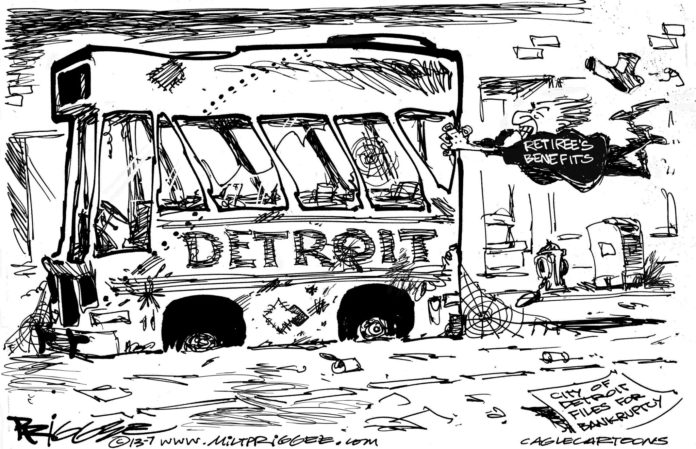BY SHARON MARTIN
 According to the Detroit Free Press, “the state Constitution describes public pensions as a ‘contractual obligation’ that ‘shall not be diminished or impaired.’”
According to the Detroit Free Press, “the state Constitution describes public pensions as a ‘contractual obligation’ that ‘shall not be diminished or impaired.’”
Detroit’s emergency city manager, bankruptcy lawyer Kevyn Orr, disagrees. Federal bankruptcy code, he says, allows contracts to be severed, pre-empts the state Constitution, and allows pensions to be reduced.
A month ago, Orr tried to talk Detroit’s city employees, retired and current, into taking voluntary pay cuts. He also proposed changes in health insurance coverage. Eligible employees would apply for Medicare. Younger employees would have to buy their own insurance on the exchanges.
Promotions would be affected. Orr wants to go to a merit system, eliminating seniority and installing “quality of the employee” rules.
If this sounds familiar, it may be that he’s reading the education-reform playbook.
Orr didn’t say how departments would determine quality. Perhaps there’s a standardized test for municipal employees?
When workers cried foul, Orr did what he must have had in mind to do all along, filed Chapter 9 bankruptcy.
When a private company goes bankrupt, the Pension Benefit Guaranty Corporation, a federal insurance program, takes over the pension plan.
PBGC isn’t funded by taxes. Companies pay insurance premiums. And when a business goes under, or seeks help to stay open, the insurance agency gets what it can from the distressed company and employees keep their pension.
Unfortunately, Detroit’s police officers, firefighters, and sanitation workers are on their own.
Imagine you’re a 75-year-old former police officer. You paid into your pension plan but not into Social Security. You are retired, in so-so health, and you live on your pension benefits.
The good news? You will be eligible for Medicare. The bad news? Paperwork and process may take several months. Let’s see, with a reduced pension, do you buy food or blood pressure meds?
For the 50-something current employee, your future is also bleak. You haven’t paid into Social Security, so there are few options. Certainly, you can’t retire. Can a 70-year-old firefighter still scramble up a ladder?
Broken promises and bankruptcy are bad deals for the men and women who’ve spent their lives in service to Detroit.
It could be bad news for public servants across the country. Cities and states with unfunded liabilities are watching these proceedings closely.
Oklahoma teachers, your paltry pension may be next.
If you work for a private corporation, contract laws and a federal agency offer some protection. If you are a government employee, remember the Indian treaties. They, too, were worthless government contracts.
– Sharon Martin lives in Oilton, OK and is a regular contributor to The Oklahoma Observer







